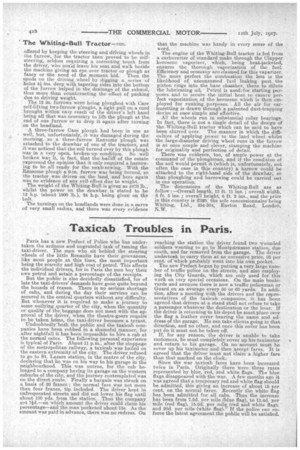Taxicab Troubles in Paris.
Page 16

If you've noticed an error in this article please click here to report it so we can fix it.
Paris has a new Prefect of Police who has undertaken the arduous and ungrateful task of taming the taxi-driver. The men who sit behind the steering wheels of the little Renaults have their grievances, like most people at this time, the most important being the scarcity and high cost of petrol. This affects the individual drivers, for in Paris the men buy their own petrol and aetain a percentage of -the receipts. But the public is also decidedly dissatisfied, for of late the taxi-drivers' demands have gone quite beyond the bounds of reason. There is no serious shortage of cabs, and during the day their services can be secured in the central quarters without any difficulty. But whenever it is required to make a journey to some outlying quarter of the city, when the quantity or quality of the baggage does not Meet with the approval of the driver, when the theatre-goers require to be taken home, the taxi-driver becomes a tyrant. Undoubtedly'both the public and the taxicab companies have been robbed in a shameful manner, for after nightfall it has been impossible to hire a cab at the normal rates. The following personal experience is typical of Paris. About 11 p.m., after the stoppage of the metropolitan railway, a taxicab'was hailed on the eastern extremity of the city. The driver refused to go,to St. Lazare station, in the centre of the city, declaring that he was on his way to his garage in the neighbourhood. This was untrue, for the cab belonged to a company having its garage on the western suburbs of the city, and the journey contemplated was on the direct route. Finally a bargain was struck on a basis of 20 francs; the normal fare was not more than four francs, tip included. The driver kept in unfrequented streets and did not lower his flag until about 100 yds. from the station. Thus the company got 7-0.—on which amount the driver could claim his percentage—and the man pocketed about 15s. As the amount was paid in advance, there was no redress. On reaching the station the driver found two wounded soldiers wanting to go to Montparnasse station, due south, and far removed from the garage. The driver undertook tocarry them at an excessive price, 95 per cent. orwhich probably went into his own pocket.
The new Prefect began by putting a very large number of traffic police on the streets, and also employing the City Guards, which are only used for this work on very special occasions. On the main boulevards and a-venues there is now a trairao policeman or Guard on an average every 50 or 60 yards. In addition, after a meeting with the drivers and the representatives of the taxicab companies, it has been agreed that drivers at a stand shall not refuse to take a passenger whatever the destination or the hour. If the driver is returning to his depot he must place over the flag a leather cover bearing the name and address of the garage. He can take clients going in that direction, and no other, and once this cover has been put on it must not be taken off.
If, for any reason, the driver is unable to take customers, he must completely -cover up his taximeter and return to his garage. On no 8,CCOUIlt must he cover up his taximeter and then accept fares. It is agreed that the driver must not -claim a higher fare than that marked on the clock.
Since the war taxicab fares have been increased twice in Paris. Originally there were three rates represented by blue, red, and white flags. The blue flags disappeared with the war. A few months ago it was agreed that a temporary red and white flag should be admitted, this giving an increase of about 15 per cent. on the normal fares. Recently the white flag has been admitted for all cabs. Thus the increase has been from 7.5d. per mile (blue flag), to 13.4d. per mile (red flag), 15.5d. per mile (red and white flag), and 20d. per mile (white flag). If the police can enforce the latest agreement the public will be satisfied.






















